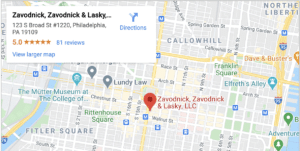
One of the most frequent and logical questions the Philadelphia workers’ compensation attorneys at Zavodnick & Lasky Personal Injury Lawyers are asked by our injured workers is “When should I settle my workers’ compensation claim?” Unfortunately, there is no standard, generic answer to this question.
Rather, the answer is different for each client, depending upon the unique set of facts and circumstances associated with the particular workers’ compensation claim they are inquiring about.
However, there are many factors that the attorneys at our firm consider when discussing with our clients whether and when to settle their work injury claims. The following list is not intended to be exhaustive, but rather merely illustrative of some of the criteria we consider when discussing these matters with our clients.
Table of Contents
Has The Claim Been Accepted And Have All Past Due Benefits Been Paid?
The first and perhaps most important criteria we look at is whether or not the claim has been formally accepted by the workers’ compensation insurance company, and whether all benefits owed to date have been paid.
This is critical because if the claim was denied and is in litigation, it oftentimes makes more sense to wait until it is accepted either by way of a judge’s decision or by an agreement between the parties before attempting to settle. This is because the insurance company handling a denied claim where it has not paid benefits typically evaluates the claim differently than the injured worker’s attorney does.
The insurance company may feel that it will be able to successfully maintain its denial and avoid paying benefits altogether. Additionally, the insurance companies frequently delay payments to injured workers in the hope that the workers, with no income coming in, will become desperate and settle for less than the fair value of their claims.
In short, settling a claim before it has been accepted can often lead to injured workers receiving less than they would have received if they waited for the judge to decide the case in their favor.
Of course, each case must be evaluated on its merits since not all claims are created equal and there are situations where it makes sense for all parties to resolve the matter before a final decision is rendered, particularly where the insurance company does have a valid defense to the workers’ compensation claim.
What Kind Of Medical Treatment Will The Injured Worker Require In The Future?
Another important factor to consider is what kind of medical treatment the workers’ compensation Claimant is expected to require in the future. This is important for several reasons.
First, the worker may not have health insurance or other means available to pay for treatment that he or she will need for the work injury in the future. The vast majority of workers’ compensation settlements involve what are known as full Compromise and Release Agreements.
What this means is that the insurance company pays the worker a lump sum of money and in exchange is relieved of its obligation to pay both wage loss and medical benefits in the future.
Thus, if our client is expected to require extensive medical treatment for his or her injuries such as surgery, injections and additional diagnostic testing, it may be advisable to hold off on attempting to resolve the workers’ compensation claim unless the worker has alternative means of paying for such treatment.
Conversely, if the worker has reached maximum medical improvement and has been informed that there are no further treatments that would be beneficial to him/her, this makes it a bit easier for the worker to give up his or her right to medical benefits in connection with a settlement of the workers’ compensation claim.
Additionally, clients who are undergoing physical therapy and/or chiropractic treatment can sometimes be given home exercise programs to perform on their own, thereby eliminating the costs associated with future medical treatment and making it easier to resolve their claims.
Lastly, where an injured worker is expected to need additional surgeries or invasive treatment in the future we may want to wait before evaluating the claim for settlement because of the uncertainty regarding the outcomes associated with such procedures and possible disability associated with the additional treatment.
In other words, if we evaluate the claim for settlement based on the expectation that the future surgery goes well and our client is able to return to gainful employment in the future but this ends up not being the case-we may have negotiated a settlement that did not adequately compensate the injured worker.
Whether The Injured Worker Will Be Able To Return To Work In The Future?
A critical, yet often overlooked factor in deciding when the timing is right to settle a workers’ compensation claim is whether the worker will be able to return to work in the future. As we often tell our clients, we may be able to get you a large lump sum payment, but what will you do after that?
Most workers’ compensation settlements do not provide the injured workers with the equivalent of wage loss benefits for the remainder of his/her lifetime, so it is important to the attorneys at Zavodnick & Lasky Personal Injury Lawyers that our clients have a plan for what they will do after they settle their cases.
If the worker is not likely to be able to find alternative employment which he/she is capable of performing, then we have to think long and hard about whether a settlement makes sense.
If we settle a case for someone who won’t be able to return to work in the near future or ever, then it is likely that our client, with no other source of income, will burn through the settlement money and potentially be worse off in a few years once he/she has done so.
This is not a desirable outcome, and it is one that our attorneys try to avoid on behalf of our clients. Likewise we have to make sure that our clients understand that once they settle their case their employer is unfortunately not going to bring them back to work, so if they are able to work they will have to find a new job on their own.
Whether There Are Any Social Security/Medicare Issues?
Many individuals who sustain workplace injuries may be eligible for social security disability benefits and/or medicare benefits. It is important that we factor this in to our settlement analysis as well as our determination as to the appropriate timing of settlement negotiations.
If a client is or is likely to become a medicare beneficiary there are guidelines published by the government that dictate when a workers’ compensation settlement must take into account medicare’s interests by creating what is known as a medicare set-aside account to cover future medical expenses related to the work injuries.
Additionally, if a client is receiving or likely to receive social security disability benefits, the social security administration takes a credit or reduction for any workers’ compensation benefits received by the social security beneficiary.
Thus, if we know that a workers’ compensation claimant may be applying for and likely to receive social security disability benefits in the near future, we may attempt to settle that individual’s claim before he/she applies for social security disability.
By doing so, we can include language in the workers’ compensation Compromise and Release Agreement which prorates the amount received over the worker’s remaining life expectancy, resulting in a lesser offset or credit once the employee begins receiving social security disability benefits.
Additionally, if we are in a position to resolve a workers’ compensation claim before an individual becomes a medicare beneficiary we have a better chance at avoiding the requirement of establishing a medicare set-aside account.
The reason we would want to avoid having to create such an account is that it ends up costing the insurance company more money, and we would rather the insurance company pay that money to the injured worker than towards a medicare set-aside account.
Whether The Insurance Company Is In A Position To Modify, Suspend Or Terminate Benefits?
As discussed above, when a claim has been denied, it oftentimes makes sense to wait to attempt to settle the claim until we are able to get the claim accepted and payments commence.
Similarly, once a claim has been accepted, another factor that comes into play in deciding when to settle is whether the insurance company is in a position to modify, suspend or terminate the injured worker’s benefits.
Timing is everything. The value of a claim is at its greatest when the injured worker is receiving indemnity or wage loss benefits and the insurance company is not in a position to challenge the worker’s ongoing receipt of those benefits. Thus, where possible, we prefer to begin negotiations during that time period so as to recover the maximum value for our clients.
Once the insurance company has had the worker attend an IME or independent medical examination, the next step typically involves the insurance company filing a petition challenging the ongoing receipt of benefits. Once the insurance company does so, their valuation of the case usually decreases because they have a chance, however slight it may be in some instances, of stopping or significantly reducing the claimant’s benefits.
So, where possible, we try to stay ahead of the game by commencing negotiations before the case is back in litigation.
There are many other case-specific factors that play a role in our evaluation process. Please feel free to contact one of the Philadelphia workers’ compensation attorneys at Zavodnick & Lasky Personal Injury Lawyers today so that we may address of all of your needs and questions.


